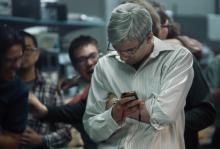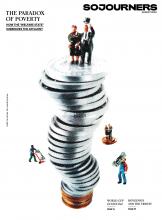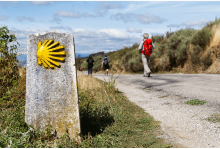introvert

Capitalist Cautionary Tale
BlackBerry highlights the role of greed in capitalism through the story of the rise of the BlackBerry smartphone. The film, which transports us to a time when smartphones weren’t omnipresent fixtures in our lives, shows the danger of valuing innovation more than ethics.
Elevation Pictures

How the “welfare state” is designed to subsidize affluence rather than fight poverty.

FOR AGES, THOSE living as monks, cloistered nuns, hermits, and wandering pilgrims have mastered the art of turning loneliness into solitude, creating a real presence to themselves, and to God. These spiritual explorers were often confined—as many of us are now—into narrow spaces, yet pilgrimage to the authentic self explores an interior landscape. The exterior pilgrimage often reflects the interior path of spiritual imagination conducted in confinement. Their lessons and practices are not cloistered today; they offer liberating tools that can resurrect and protect the space for real presence for all who desire detachment from the omnipresence of screens. Simply consider this: You can’t walk on unexpected pathways while looking at screens.
Untethered from normalcy
Pilgrims move in two directions at the same time—an outward direction toward a holy destination and an inward journey seeking an encounter with the sacred. Two of the best academic scholars of pilgrimages, Victor and Edith Turner, explain it in this one sentence: “Pilgrimage may be thought of as extroverted mysticism, just as mysticism is introverted pilgrimage.”
Pilgrimages, they suggest, were, and are, no walk in the park, or plain, or mountain. Embarking on such a journey, we become untethered not just from our physical normalcy. These uncertain, trusting steps also move us out of our spiritual familiarity. The pilgrim is invited not only to walk out of boxes of dogmatic beliefs but also to walk away from practices of comfortable spirituality.
This article is adapted from Without Oars: Casting Off Into a Life of Pilgrimage (Broadleaf Books, November 2020).

I looked at the list of opportunities. New neighbor volunteers. Resettlement service volunteers. Adult literacy training. My introverted heart fluttered inside of me, wanting to help, and yet so aware of its own limitations.
In the end, I chose to work in the Refugee donation center. It felt like a cop-out, a suburban, guilt-assuaging kind of “volunteering” that had nothing to do with social justice or Kingdom work or the irresistible revolution.
And yet, perhaps, that’s not true. Perhaps the pursuit of justice is not something that requires me to sacrifice my introverted soul – but rather to lean into it.

Recently I’ve been re-reading Susan Cain’s excellent book, Quiet: the Power of Introverts in a World that Can’t Stop Talking. Extroverts will want to take it with a grain of salt (although some of the book’s speculations suggest that extroverts are fairly thick-skinned about being taken down off their pedestals), but the book is a fascinating exploration of what it’s like to be an introvert in the world, including some analysis about how one gets to be an introvert, anyway, including how much is genetic, and how much comes from early environment.
It was in reading one of these “nature or nurture?” passages that I first encountered the “orchid hypothesis.” Taking its name from David Dobbs’ 2009 article, “The Science of Success,” published in The Atlantic, the orchid hypothesis essentially argues, as Cain puts it, that:
“… many children are like dandelions, able to thrive in just about any environment. But others, including the high-reactive types that [developmental psychologist Jerome Kagan] studied, are more like orchids: they wilt easily, but under the right conditions can grow strong and magnificent.” (Quiet, 111)
This jumped off the page at me.